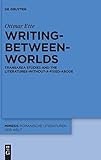Writing-between-Worlds : TransArea Studies and the Literatures-without-a-fixed-Abode / Ottmar Ette.
Material type: TextSeries: Mimesis : Romanische Literaturen der Welt ; 64Publisher: Berlin ; Boston : De Gruyter, [2016]Copyright date: ©2016Description: 1 online resource (XXIV, 339 p.)Content type:
TextSeries: Mimesis : Romanische Literaturen der Welt ; 64Publisher: Berlin ; Boston : De Gruyter, [2016]Copyright date: ©2016Description: 1 online resource (XXIV, 339 p.)Content type: - 9783110461091
- 9783110461121
- 9783110462876
- 809 23/eng/20230216
- online - DeGruyter
- Issued also in print.
| Item type | Current library | Call number | URL | Status | Notes | Barcode | |
|---|---|---|---|---|---|---|---|
 eBook
eBook
|
Biblioteca "Angelicum" Pont. Univ. S.Tommaso d'Aquino Nuvola online | online - DeGruyter (Browse shelf(Opens below)) | Online access | Not for loan (Accesso limitato) | Accesso per gli utenti autorizzati / Access for authorized users | (dgr)9783110462876 |
Frontmatter -- Contents -- Translator’s Introduction -- Preface: What does literature know? -- 1. Transit -- 2. Figurations -- 3. Relations -- 4. Incubations -- 5. Translations -- 6. Oscillations -- 7. Confrontations -- 8. In(tro)spections -- 9. Configurations -- Note on the Text and Acknowledgments -- Bibliography -- Name Index
restricted access online access with authorization star
http://purl.org/coar/access_right/c_16ec
This book proposes that there is no better, no more complex way to access a community, a society, an era and its cultures than through literature. For millennia, literature from a wide variety of geocultural areas has gathered knowledge about life, about survival, and about living together, without either falling into discursive or disciplinary specializations or functioning as a regulatory mechanism for cultural knowledge. Literature is able to offer its readers knowledge through direct participation in the form of step-by-step intellectual and affective experiences. Through this ability, it can reach and affect audiences across great spatial and temporal distances. Literature – what different times and cultures have been able to understand as such in a broad sense – has always been characterized by its transareal and transcultural origins and effects. It is the product of many logics, and it teaches us to think polylogically rather than monologically. Literature is an experiment in living, and living in a state of experimentation. About the author Ottmar Ette has been Chair of Romance Literature at the University of Potsdam, Germany, since 1995. He is Honorary Member of the Modern Language Association of America (MLA) (elected in 2014), member of the Berlin-Brandenburg Academy of Sciences and Humanities (elected in 2013), and regular member of the Academia Europaea (since 2010).
Issued also in print.
Mode of access: Internet via World Wide Web.
In English.
Description based on online resource; title from PDF title page (publisher's Web site, viewed 25. Jun 2024)


